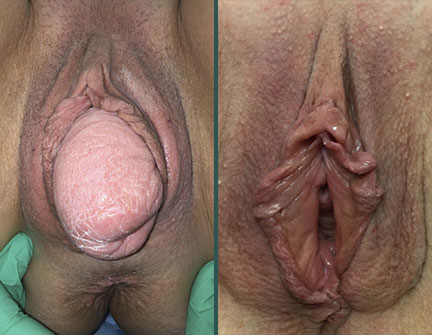Pelvic Organ Prolapse: Something falling out of the vagina
What is a prolapse?
A prolapse is a dropping of surrounding organs into the vagina. This can include the bladder (cystocele), uterus, small intestine (enterocele) or rectum (rectocele). In some cases, there is prolapse of all of these organs, causing a significant sensation of pelvic pressure, a vaginal bulge or even of something “falling out of the vagina.”
Prolapse is staged on a stage of 1-3, based on the amount of descent present.
A stage 1 prolapse means there is minimal dropping of the organ present. A stage three prolapse means the adjacent organ has dropped as far as possible. When the bladder, uterus and rectum are protruding all the way beyond the opening of the vagina or the introitus, this is known as total prolapse or complete procidentia. The treatment for total prolapse is a surgical repair to restore the anatomy of the vagina and often a hysterectomy, if the uterus is still in place.
The image below depicts a 54 year old female with complete pelvic organ prolapse. The dry appearing tissue is the uterus and bladder that have been stretched out and thinned. The second image you see is the same patient after surgery. She underwent a trans-vaginal hysterectomy and da Vinci sacrocolpoperineopexy. She had felt an increasing vaginal bulge sensation for years, which eventually progressed to a bulge outside of the vagina.
Advanced Prolapse Complications
Complications of advanced prolapse can include urinary tract infections, poor bladder emptying, pelvic pain, breakdown of the vaginal mucosa due to thinning and rubbing of the tissue, and pain with intercourse. Initially, prolapse can be small and asymptomatic. When this is the case, the prolapse can be managed conservatively or if the changes in anatomy are bothersome, a reconstructive surgery can be performed. In addition to restoring the anatomy, the relaxed vagina is tightened, enhancing sensation with intercourse. Prolapse symptoms of vaginal bulge, poor bladder emptying, urinary frequency or urgency, constipation, incomplete defecation, and lower back pain should resolve following prolapse repair.
Got questions? Need an appointment? We’re here to help!
